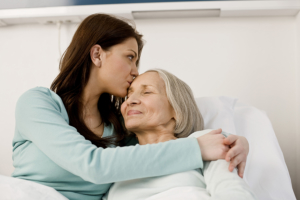Preventing Pressure Sores and Keeping Skin Healthy

Our Laguna Hills home care experts explain how to prevent pressure sores.
Pressure sores—also called bed sores or pressure ulcers—are skin injuries that result from prolonged pressure against the skin that inhibits an adequate supply of blood to the skin. Pressure sores occur most often in those who are confined to a bed or wheelchair.
Pressure sores can develop quickly and are often difficult to treat; however, there are strategies to help prevent them.
Position Changes:
Position changes are key to preventing pressure sores. Repositioning needs to:
- Be frequent (every hour for those who are wheelchair bound, every 2 hours for those who are bedbound)
- Avoid stress on the skin (lifting devices are often used to avoid friction during repositioning)
- Minimize the risk of pressure on vulnerable, bony areas such as hips, elbows, knees and ankles
Support:
Support surfaces include special cushions, pads, mattresses and beds which can help a person:
- Lie in an appropriate position (ex: lie at an angle rather than directly on a hip and have cushions supporting the back or front)
- Relieve pressure (ex: place cushions between the knees and ankles)
- Protect vulnerable skin from damage. (ex: float heels by placing cushions below the calves)
Skin Care:
Care must be taken to make sure skin is clean and neither too dry nor too moist.
- When bathing, skin should be cleaned with mild soap and warm (not hot) water and gently patted dry. A no-rinse cleanser can also be used. Bathing is also the best time to check the skin for signs of pressure sores.
- Skin that is vulnerable to excess moisture can be protected with talcum powder. Dry skin should have lotion applied.
- A massage can increase circulation and help protect against pressure sores.
Good Nutrition:
Keep skin as healthy as it can be by maintaining good nutrition.
- A doctor or dietitian can recommend dietary changes that can help improve skin health and may prescribe dietary supplements, such as vitamin C and zinc.
- Adequate hydration is important for maintaining healthy skin. Signs of poor hydration include decreased urine output, darker urine, dry or sticky mouth, thirst, dry skin or constipation.
Smoking:
It is important to stop smoking because it is damaging for the skin. The healthier the skin is, the less prone it will be to developing pressure sores.
Activity:
Daily exercise that is appropriately matched to a person’s abilities is important to maintaining healthy skin. A physical therapist can recommend an appropriate exercise program that improves circulation, stimulates appetite and strengthens the body.
Skin Inspections:
An experienced caregiver from CareWorks Health Services can assist with daily skin inspection, which is important for identifying vulnerable areas of skin or early signs of pressure sores.
When to See a Doctor:
If signs or symptoms of a pressure ulcer are noticed, contact the doctor. It is also important to get immediate medical care if signs of infection are noticed, such as fever, drainage or foul odor from a sore, or increased heat and redness in the surrounding skin.
A qualified, specially trained caregiver from CareWorks Health Services can help persons who are confined to a bed or wheelchair avoid pressure sores and maintain healthy skin, including:
- Bathing and moisturizing
- Inspecting for changes
- Incontinence skin care
- Preparing healthy, diet-specific meals
- Assisting with a physician-approved exercise/activity regimen
Contact CareWorks Health Services today for more information.
Sources: Mayo Clinic, National Pressure Ulcer Advisory Panel, AgingCare
Click here to download a printable PDF version of this page.
